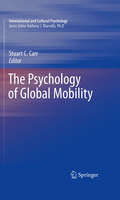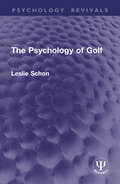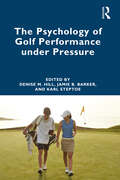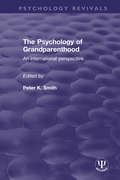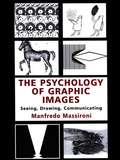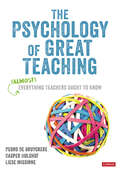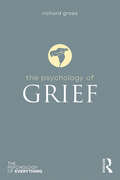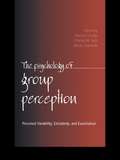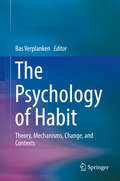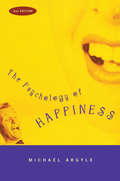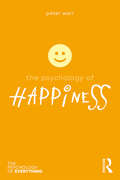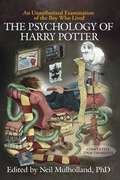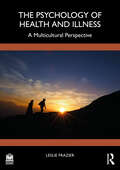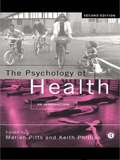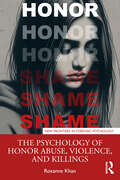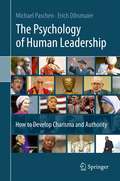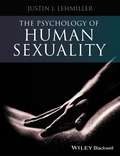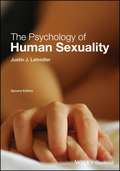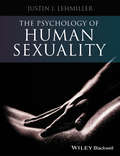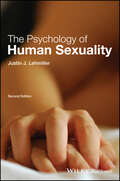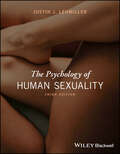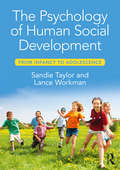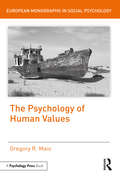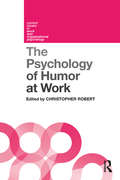- Table View
- List View
The Psychology of Global Mobility
by Stuart C. CarrHuman mobility has been a defining feature of human social evolution. In a global community, the term "mobility" captures the full gamut of types, directions, and patterns of human movement. The psychology of mobility is important because movement is inherently behavioral. Much of the behavioral study of mobility has focused on the negative - examining the trauma of forced migration, or the health consequences of the lack of adaptation - but this work looks into the benefits of mobility, such as its impact on career capital and well-being. Recent years have witnessed a phenomenal increase in efforts to understand human mobility, by social scientists, think-tanks, and policymakers alike. The book focuses on the transformational potential of mobility for human development. The book details the historical, methodological, and theoretical trajectory of human mobility (Context), followed by sections on pre-departure incentives and predispositions (Motivation), influences on acculturation, health and community fit (Adjustment), and changes in career capital, overcoming bias, and diaspora networks (Performance).
The Psychology of Golf (Psychology Revivals)
by Leslie SchonFirst published in 1922, The Psychology of Golf examines the mental side of golf from the point of view of the player, and the author’s whole aim is to assist and interest both the expert and the novice. The game of golf is nine-tenths mental and this book attempts to develop those mental skills in a golf player.
The Psychology of Golf Performance under Pressure
by Denise M. Hill Jamie B. Barker Karl SteptoeThe Psychology of Golf Performance under Pressure offers contemporary, research-informed information regarding the key psychological factors affecting golf development and performance under pressure. Through the authors’ substantive expertise – all of whom are notable scholars and/or practitioners in the field of golf psychology – the text provides a highly accessible “real world” application of theory to practice, through the provision of evidence-based guidance regarding how to maximise golf performance under pressure. Golf is a sport that has embraced sport psychology, with many of the highest ranked players in the world (male and female) openly working with a sport psychologist and advocating their importance. As a result, an increasing number of high-profile practitioners are working full-time within the sport around the world, encouraging trainee sport psychology practitioners to pursue their career within golf. Accordingly, there is an ever-increasing demand for high-quality information pertaining to the psychological demands of golf; the key psychological variables that affect golfing development and performance; and evidence-based strategies which enable effective golf performance under pressure. This novel text provides a comprehensive portrayal of the psychological factors which enable effective golfing development and optimal performance under pressure. A theoretical review of the pertinent psychological factors followed by the practical application of theory for the provision of “take home messages” will ensure that this book is of value, interest, and benefit for golfers, coaches, golf organisations, and even the parents of golfers, alongside sport psychology scholars, students, practitioners, and researchers alike.
The Psychology of Grandparenthood: An International Perspective (Psychology Revivals)
by Peter K. SmithThe majority of people will now spend about one-third of their lives as grandparents, yet developmental psychologists have largely ignored the nature of the grandparental role, and the influence which grandparents can have on grandchildren. Originally published in 1991, this book redresses the balance and uses life-span evolutionary and psychodynamic theoretical frameworks to provide a comprehensive analysis of the phenomenon of grandparenthood from cross-cultural perspectives. Much recent work in developmental psychology has disregarded the extended family in favour of the two-generational nuclear family of parents and children. But grandparents do have a significant role in family relationships and children’s development. This volume contains detailed discussion of intergenerational transmission of parenting skills, cooperation and conflict in three-generational families and the ways in which grandparents and grandchildren perceive one another. The importance of considering social and cultural contexts of development applies to grandparents just as much as to other areas of human development. Kinds of family structure, social policies regarding employment, health and housing, attitudes to marriage and even particular historical events all have an impact on the position and role of grandparents and on stereotypes of old age. These factors vary considerably from country to country. Our understanding of grandparenthood can only be enriched by learning about the variety of ways in which it is expressed in different cultural settings. Most previous research has been confined to the USA. This book is truly international containing contributions from Britain, Canada, Finland, Italy, the Netherlands, Poland, West Germany and the USA. International comparisons enable us to see which elements are essential to grandparenthood and which are culture dependant. In most Western countries the population is ageing and this sort of study is becoming vitally important. The Psychology of Grandparenthood is required reading for anybody who is professionally involved with the elderly and for psychologists interested in development, the life-span and family systems.
The Psychology of Graphic Images: Seeing, Drawing, Communicating
by Manfredo Massironi Translated by BrunoThis book explores the nature of one of the most ancient tools for nonverbal communication: drawings. They are naturally adaptable enough to meet an incredibly wide range of communication needs. But how exactly do they do their job so well? Avoiding the kinds of aesthetic rankings of different graphic domains so often made by art historians and critics, Manfredo Massironi considers an extensive and representative sample of graphic applications with an open mind. He finds a deep mutuality between the material components of images and the activation of the perceptual and cognitive processes that create and decipher them. Massironi first examines the material components themselves: the mark or line, the plane of representation (the angle formed by the actual drawing surface and the depicted objects), and the position of the viewpoint relative to the depicted objects. The roles played by these three components are independent of the content of the drawing; they function in the same way in concrete and abstract representations. He then closely scrutinizes the choices made by the person planning and executing the drawings. Given that any object can be depicted in an infinite number of different ways, the drawer performs continuous work emphasizing and excluding different features. The choices are typically unconscious and guided by his or her communicative goals. A successful graph, be it simple or complex, is always successful precisely because the emphasized features are far fewer in number than the excluded ones. Finally, he analyzes the perceptual and cognitive integrations made by the viewer. Drawings are not simply tools for communication but important instruments for investigating reality and its structure. Richly illustrated, the book includes a series of graphic exercises that enable readers to get a sense of their own perceptual and cognitive activity when inspecting images. Massironi's pathbreaking taxonomy of graphic productions will illuminate all the processes involved in producing and understanding graphic images for a wide audience, in fields ranging from perceptual and cognitive psychology through human factors and graphic design to architecture and art history.
The Psychology of Great Teaching: (Almost) Everything Teachers Ought to Know
by Pedro De Bruyckere Casper Hulshof Liese MissinneThis is your essential teaching companion that offers a broad understanding of modern psychology and how ideas from psychological theory and research can be relevant to any classroom. Explore robust, current ideas and contemporary findings from different psychological disciplines, such as cognitive psychology, developmental psychology, social psychology, personality theory and systems theory, and learn new insights to enhance your teaching. Deepen your knowledge of how students and young people develop as individuals and how a greater understanding of human behaviour can make you a more effective teacher. Each chapter includes ‘teacher takeaways’ offering practical advice on how to translate up-to-date psychological ideas into effective teaching techniques. The perfect read for teachers and those training to teach school students of any age. Pedro De Bruyckere is an educational scientist at the Artevelde University College of Applied Sciences and Leiden University. Casper Hulshof is a psychologist who teaches Educational Science at Utrecht University. Liese Missinne is an educational scientist and teacher trainer at the Artevelde University College of Applied Sciences.
The Psychology of Great Teaching: (Almost) Everything Teachers Ought to Know
by Pedro De Bruyckere Casper Hulshof Liese MissinneThis is your essential teaching companion that offers a broad understanding of modern psychology and how ideas from psychological theory and research can be relevant to any classroom. Explore robust, current ideas and contemporary findings from different psychological disciplines, such as cognitive psychology, developmental psychology, social psychology, personality theory and systems theory, and learn new insights to enhance your teaching. Deepen your knowledge of how students and young people develop as individuals and how a greater understanding of human behaviour can make you a more effective teacher. Each chapter includes ‘teacher takeaways’ offering practical advice on how to translate up-to-date psychological ideas into effective teaching techniques. The perfect read for teachers and those training to teach school students of any age. Pedro De Bruyckere is an educational scientist at the Artevelde University College of Applied Sciences and Leiden University. Casper Hulshof is a psychologist who teaches Educational Science at Utrecht University. Liese Missinne is an educational scientist and teacher trainer at the Artevelde University College of Applied Sciences.
The Psychology of Grief (The Psychology of Everything)
by Richard GrossWhat is happening emotionally when we grieve for a loved one? Is there a ‘right’ way to grieve? What effect does grief have on how we see ourselves? The Psychology of Grief is a humane and intelligent account that highlights the wide range of responses we have to losing a loved one and explores how psychologists have sought to explain this experience. From Freud’s pioneering psychoanalysis to discredited ideas that we must pass through ‘stages’ of grief, the book examines the social and cultural norms that frame or limit our understanding of the grieving process, as well as looking at the language we use to describe it. Everyone, at some point in their lives, experiences bereavement and The Psychology of Grief will help readers understand both their own and others’ feelings of grief that accompany it.
The Psychology of Group Perception: Perceived Variability, Entitativity, And Essentialism
by Charles M. Judd Olivier Corneille Vincent YzerbytThis groundbreaking work by leading social psychologists, who have all contributed in important ways to the psychology of group perception, focuses in particular on three interrelated issues: (1) whether groups are seen to be diverse or relatively homogeneous; (2) whether groups are seen as real and stable or only transitory and ephemeral; and (3) whether group membership derives from some essential quality of the members or rather is based on social constructions.
The Psychology of Habit: Theory, Mechanisms, Change, and Contexts
by Bas VerplankenThis unique reference explores the processes and nuances of human habits through social psychology and behavioral lenses. It provides a robust definition and theoretical framework for habit as well as up-to-date information on habit measurement, addressing such questions as which mechanisms are involved in habitual action and whether people can report accurately on their own habits. Specialized chapters pay close attention to how habits can be modified, as well as widely varying manifestations of habitual thoughts and behaviors, including the mechanisms of drug addiction and recovery, the repetitive characteristics of autism, and the unwitting habits of health professionals that may impede patient care. And across these pages, contributors show the potential for using the processes of maladaptive habits to replace them with positive and health-promoting ones. Throughout this volume attention is also paid to the practice of conducting habit research. Among the topics covered: Habit mechanisms and behavioral complexity.Complexities and controversies of physical activity habit.Habit discontinuities as vehicles for behavior change.Habits in depression: understanding and intervention.A critical review of habit theory of drug dependence.Questions about the automaticity of habitual behaviors. The Psychology of Habit will interest psychologists across a wide spectrum of domains: habit researchers in broader areas of social and health psychology, professionals working in (sub)clinical areas, interested scholars in marketing, consumer research, communication, and education, and public policymakers dealing with questions of behavioral change in the areas of health, sustainability, and/or education.
The Psychology of Happiness
by Michael ArgyleWhat is happiness? Why are some people happier than others? This new edition of The Psychology of Happiness provides a comprehensive and up-to-date account of research into the nature of happiness. Major research developments have occurred since publication of the first edition in 1987 – here they are brought together for the first time, often with surprising conclusions. Drawing on research from the disciplines of sociology, physiology and economics as well as psychology, Michael Argyle explores the nature of positive and negative emotions, and the psychological and cognitive processes involved in their generation. Accessible and wide-ranging coverage is provided on key issues such as: the measurements and study of happiness, mental and physical health; the effect of friendship, marriage and other relationships on positive moods; happiness, mental and physical health; the effects of work, employment and leisure; and the effects of money, class and education. The importance of individual personality traits such as optimism, purpose in life, internal control and having the right kind of goals is also analysed. New to this edition is additional material on national differences, the role of humour, and the effect of religion. Are some countries happier than others? This is just one of the controversial issues addressed by the author along the way. Finally the book discusses the practical application of research in this area, such as how happiness can be enhanced, and the effects of happiness on health, altruism and sociability. This definitive and thought-provoking work will be compulsive reading for students, researchers and the interested general reader
The Psychology of Happiness (The Psychology of Everything)
by Peter WarrIs happiness all down to luck? Do events in our life influence how happy we feel? Can too much of a good thing make us less happy? The Psychology of Happiness introduces readers to the variety of factors that can affect how happy we are. From our personality and feelings of self-worth, to our physical health and employment status, happiness is a subjective experience which will change throughout our lives. Although feeling happy is linked with positive thinking and our sociability in daily life, the book also includes surprising facts about the limitations of our personal happiness. We all want to feel happy in our lives, and The Psychology of Happiness shows us that achieving it can be both an accident of fortune and as a direct result of our own actions and influence.
The Psychology of Harry Potter: An Unauthorized Examination Of The Boy Who Lived
by Neil MulhollandHarry Potter has provided a portal to the wizarding world for millions of readers, but an examination of Harry, his friends and his enemies will take us on yet another journey: through the psyche of the Muggle (and wizard!) mind. The twists and turns of the series, as well as the psychological depth and complexity of J. K. Rowling&’s characters, have kept fans enthralled with and puzzling over the many mysteries that permeate Hogwarts and beyond: Do the Harry Potter books encourage disobedience? Why is everyone so fascinated by Professor Lupin? What exactly will Harry and his friends do when they finally pass those N.E.W.T.s? Do even wizards live by the ticking of the clock? Is Harry destined to end up alone? And why did it take Ron and Hermione so long to get together? Now, in The Psychology of Harry Potter, leading psychologists delve into the ultimate Chamber of Secrets, analyzing human mind and motivation by examining the themes and characters that make the Harry Potter books the bestselling fantasy series of all time. Grab a spot on the nearest couch, and settle in for some fresh revelations about our favorite young wizard!
The Psychology of Health and Illness: A Multicultural Perspective
by Leslie D. FrazierThe Psychology of Health and Illness is a thoroughly updated version of Leslie Frazier’s previous textbook on health psychology, which provides an engaging and contemporary approach to understanding health psychology from a truly international perspective. Combining both biopsychosocial and lifespan developmental perspectives, the book integrates core theory, research, and practice on global and cross-cultural health issues. It includes thoughtful and deliberately inclusive coverage of marginalized groups, especially BIPOC, LGBTQ+, and other underrepresented groups, designed to raise diversity and racial consciousness in a globally integrative way.Alongside classic health psychology concepts, the author introduces students to cutting-edge scientific and medical topics such as epigenetics, the gut microbiome, and the nonmedical use of prescription drugs. The book also focuses on global public health and health disparities and promotes a strengths-based approach to health, rather than a deficits-based approach. It includes a wide range of pedagogical features including real-world applications, engaging anecdotes and case studies, opportunities for self-reflection, and numerous text boxes.This is essential reading for undergraduate students on Health Psychology courses as well as those in related fields such as nursing and the allied health professions.
The Psychology of Health: An Introduction
by Keith Phillips Marian PittsThe first edition of The Psychology of Health has become the standard recommended text for many courses. This completely revised and updated second edition contains new material in all chapters and has several additional chapters on such topics as cancer, nutrition and exercise, social drugs, and the impact of social inequalities upon health. The Psychology of Health will continue to be invaluable for students of health psychology and related fields, including nursing, social work, community care and health studies.The Psychology of Health, second edition, is:* comprehensive: its four parts cover the scope and ambition of health psychology, acute and chronic illness, hospitalisation and the management of disease, primary prevention and health promotion, the importance of the family and the wider social context for health* user-friendly: includes tables, figures and boxes with discussion ideas and questions in each chapter. Prefaces to each part, key point summaries and a glossary of terms give students a useful framework for revision* clearly written by an experienced team involved in undergraduate teaching* a source for further study: with annotated guides to reading and an extensive bibliography.
The Psychology of Honor Abuse, Violence, and Killings (New Frontiers in Forensic Psychology)
by Roxanne KhanThis important book provides a much-needed exploration and examination of "honor" abuse, violence, and killings from a psychological perspective. Written by a leading authority on the subject, the book draws on a wide range of research and theory on victims and perpetrators to bridge the gap between research and practice.Presented in two parts, the book begins with a focus on teaching, research, and practice issues in forensic psychology and related criminal justice fields, integral to studying and working with victims and perpetrators of "honor" abuse, violence, and killing. The second part provides an overview of the main issues relevant to the psychology of honor abuse, violence, and killings. These include definitions, prevalence, crime characteristics, victims, and perpetrators. The final chapter presents a new explanatory three-phase model of "honor"-based abuse perpetration. Firsthand personal accounts and detailed cases studies are interwoven throughout, giving a voice to victims and bringing their real-life stories to the forefront.As the first psychologically based book to synthesize existing and new knowledge on "honor" abuse, the book is a must-read for anyone working with victims and/or perpetrators of "honor" abuse and domestic violence, including criminal justice professionals, mental health practitioners, policymakers, support agencies, emergency workers, and activists. It is also relevant for any students or researchers of gender-based violence and racially minoritized communities.
The Psychology of Human Leadership: How To Develop Charisma and Authority
by Erich Dihsmaier Michael PaschenThe book seamlessly links fundamental insights and practical approaches to address the most important leadership problems and challenges. Each of the 11 chapters takes a close look at a specific leadership aspect and explains how to develop personal leadership qualities, such as charisma, the ability to motivate others, assertiveness, and how to overcome crises and conflicts to create new structures. Ethical questions and possible negative developments in connection with leadership and power are also examined. Unlike conventional leadership manuals, this book on leadership goes beyond the standard 'recipes' and models by providing clear trains of thought as well as a psychological and philosophical basis, and by focusing on major achievements in terms of leadership, it creates a more profound understanding and holistic view of the subject of leadership, while promoting a genuine fascination for it.
The Psychology of Human Sexuality
by Justin J. LehmillerThis book offers a comprehensive overview of human sexual behavior from a biopsychosocial perspective.
The Psychology of Human Sexuality
by Justin J. Lehmiller<p>The thoroughly revised and updated second edition of The Psychology of Human Sexuality explores the roles that biology, psychology, and the social and cultural context play in shaping human sexual behavior. The author – a noted authority on the topic and an affiliate of the acclaimed Kinsey Institute - puts the spotlight on the most recent research and theory on human sexuality, with an emphasis on psychology. <p>The text presents the major theoretical perspectives on human sexuality, and details the vast diversity of sexual attitudes and behaviors that exist in the modern world. The author also reviews the history of sexology and explores its unique methods and ethical considerations. Overall, this important and comprehensive text provides readers with a better understanding of, and appreciation for, the science of sex and the amazing complexity of human sexuality.</p>
The Psychology of Human Sexuality
by Justin J. LehmillerThe Psychology of Human Sexuality offers a comprehensive overview of human sexual behavior from a biopsychosocial perspective. The text highlights psychological research and theory on human sexuality whilst also considering the biological, evolutionary, social, and cultural factors that influence our sex lives. Features comprehensive coverage of topics including gender and sexual orientation, relationships, sexual behaviors, sexual difficulties and solutions, prostitution, and pornography Offers more in-depth treatment of relationships than comparable texts, with separate chapters dealing with attraction and relationship processes Written from a sex-positive perspective, and is inclusive and respectful of a diverse audience Includes numerous activities to facilitate a dynamic and interactive classroom environment
The Psychology of Human Sexuality
by Justin J. LehmillerNew edition of an authoritative guide to human sexual behavior from a biopsychosocial perspective The thoroughly revised and updated second edition of The Psychology of Human Sexuality explores the roles that biology, psychology, and the social and cultural context play in shaping human sexual behavior. The author – a noted authority on the topic and an affiliate of the acclaimed Kinsey Institute - puts the spotlight on the most recent research and theory on human sexuality, with an emphasis on psychology. The text presents the major theoretical perspectives on human sexuality, and details the vast diversity of sexual attitudes and behaviors that exist in the modern world. The author also reviews the history of sexology and explores its unique methods and ethical considerations. Overall, this important and comprehensive text provides readers with a better understanding of, and appreciation for, the science of sex and the amazing complexity of human sexuality. Features broad coverage of topics including anatomy, gender and sexual orientation, sexual behaviors, sexual difficulties and solutions, prostitution, and pornography Offers more in-depth treatment of relationships than comparable texts, with separate chapters dealing with attraction and relationship processes Includes cutting-edge research on the origins of sexual orientation and gender identity, as well as new treatments for sexually transmitted infections and sexual dysfunctions Is written from a sex-positive perspective, with expanded coverage of cross-cultural research throughout and material that is inclusive and respectful of a diverse audience Includes numerous activities to facilitate dynamic, interactive classroom environments Written for students of human sexuality and anyone interested in the topic, The Psychology of Human Sexuality offers a guide to the psychology of human sexual behavior that is at once inclusive, thorough, and authoritative in its approach.
The Psychology of Human Sexuality
by Justin J. LehmillerThe Psychology of HUMAN SEXUALITY New edition of an authoritative guide to human sexual behavior from a biopsychosocial perspective The Psychology of Human Sexuality is a comprehensive guide to major theoretical perspectives on human sexuality and the vast diversity of sexual attitudes and behaviors around the world, with broad coverage of topics including anatomy, gender and sexual orientation, sexual behaviors, sexual difficulties and solutions, sex work and pornography. Written from a sex-positive perspective with material that is inclusive and respectful of a diverse audience, the text includes cutting edge research on the origins of sexual orientation and gender identity, as well as new treatments for sexually transmitted infections and diseases. To aid in student learning, the text is accompanied by online resources, including a test bank and instructor slides. Separate chapters deal with attraction and relationship processes. The Psychology of Human Sexuality includes information on: Sex science studies that researchers have failed to reliably replicate since the 2nd Edition was published, and the broader “replication crisis” in psychology “Graysexual” identities that fall on the spectrum between allosexual and asexual, and the sex recession of modern times Recent studies that shed light on sexual behavior in cultures that have previously been the subject of very little study Sex and disability, and “take-home messages” to allow readers to implement beneficial changes in their lives An important and comprehensive text that provides readers with a better understanding of, and appreciation for, the science of sex and sexual diversity, The Psychology of Human Sexuality is an essential resource for students of human sexuality in both intermediate and advanced undergraduate courses.
The Psychology of Human Social Development: From Infancy to Adolescence
by Lance Workman Sandie TaylorThe Psychology of Human Social Development provides a comprehensive introduction to the essential core topics and exciting new findings in this thriving field of developmental psychology. Following a thematic approach, the book looks at key topics in social development in childhood and adolescence, including personality development and research methods, taking the reader from first principles to an advanced understanding. The book explores socio-emotional development and social learning, as well as the history of thinking, and the evolutionary roots of social development, whilst also providing a clear balance between nature and nurture approaches. Taylor and Workman’s user-friendly writing style accommodates readers with no previous knowledge of the subject area whilst exploring the most up-to-date theories and research from various areas of psychology which have gained relevance to developmental psychology. Featuring student-friendly pedagogy throughout, including end-of-chapter summaries, further reading recommendations and questions for discussion, The Psychology of Human Social Development is essential reading for undergraduates on social development or developmental psychology courses and relevant for related fields such as education, gender studies and nursing.
The Psychology of Human Values (European Monographs in Social Psychology)
by Gregory R MaioThis original and engaging book advocates an unabashedly empirical approach to understanding human values: abstract ideals that we consider important, such as freedom, equality, achievement, helpfulness, security, tradition, and peace. Our values are relevant to everything we do, helping us choose between careers, schools, romantic partners, places to live, things to buy, who to vote for, and much more. There is enormous public interest in the psychology of values and a growing recognition of the need for a deeper understanding of the ways in which values are embedded in our attitudes and behavior. How do they affect our well-being, our relationships with other people, our prosperity, and our environment? In his examination of these questions, Maio focuses on tests of theories about values, through observations of what people actually think and do. In the past five decades, psychological research has learned a lot about values, and this book describes what we have learned and why it is important. It provides the first overview of psychological research looking at how we mentally represent and use our values, and constitutes important reading for psychology students at all levels, as well as academics in psychology and related social and health sciences.
The Psychology of Humor at Work: A Psychological Perspective
by Christopher RobertThis is the first book to look at the psychological processes that enable humor to affect people and teams in the workplace. It recognizes that humor plays many roles beyond making people feel happier and more productive, and acknowledges humor’s potential darker side as well. Bringing together a small but growing field of study, the book features chapters around core psychological topics such perception, creativity and stress, while also addressing organizational issues such as leadership, teamwork, and social networks. The collection concludes with chapters on the role of humor in recruitment processes, as well as how humor consultants work with organizations. Each chapter in The Psychology of Humor at Work not only provides a comprehensive review of what is known in that area, but also considers future directions for research and practice. It will prove fascinating reading for students, practitioners and researchers in organizational psychology, HRM, and business and management.
